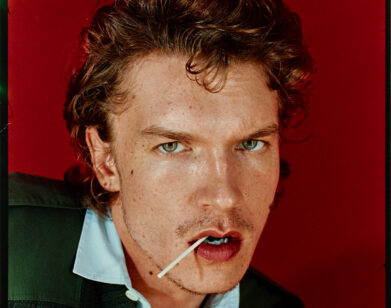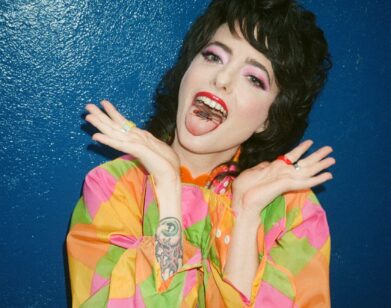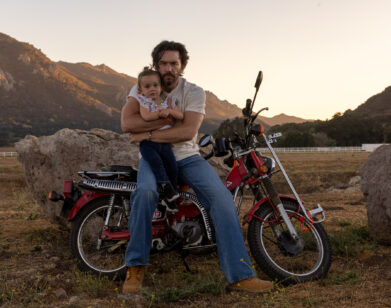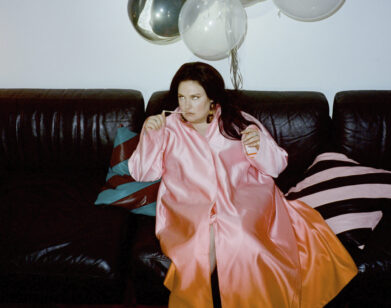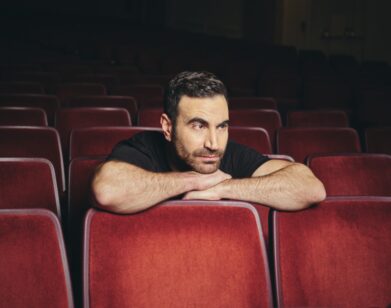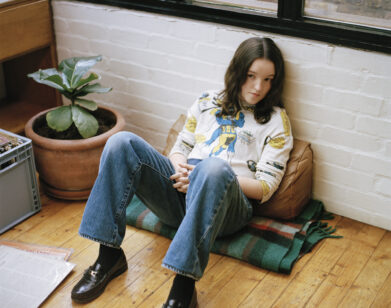in conversation
Barry‘s Anthony Carrigan Tells Bill Hader How He Became NoHo Hank
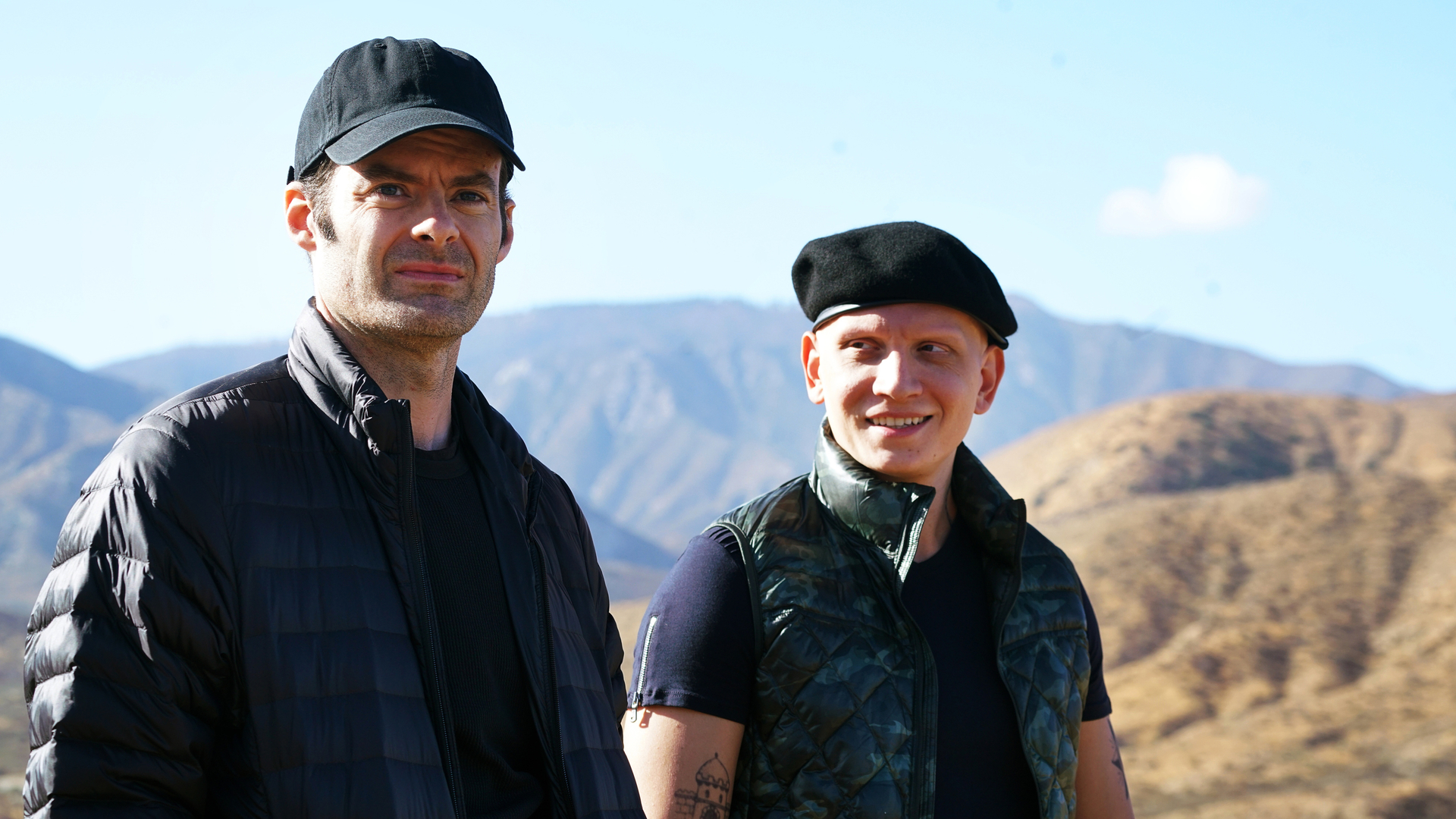
Bill Hader and Anthony Carrigan. Photos courtesy of HBO.
Barry has returned for its third season, much to the delight of the six-time Emmy winning comedy’s avid fan base. One of the show’s standout characters is NoHo Hank, a frisky Chechen mobster who has garnered a cult following all his own over the HBO production’s four-year run. The disarmingly ditzy mafioso, played by Anthony Carrigan, was originally scripted to die off after the show’s pilot, but once Bill Hader—Barry’s star and co-creator—saw the actor’s audition tape, he knew a rewrite was in order. For Carrigan, bringing Hank to life is about more than scoring laughs—the experience has restored his resolve in an industry too often preoccupied with the superficial. To mark the release of Barry’s latest season, Carrigan and Hader jumped on the phone for a conversation about nailing auditions, mastering your fears, and the power of good timing—comedic and otherwise.
———
BILL HADER: We met when I was sent a tape of your Barry audition. Let me ask you this: What was happening right before that? Where were you at in your career, your life?
ANTHONY CARRIGAN: I was playing this character called Victor Zsazs on Gotham. I was having a great time with it, but I was playing an absolute, merciless psycho. I was ready to shake it up a little bit and do something different. This character came in and split the difference.
HADER: Was comedy ever a thing that you had done before? You did Parenthood, that was funny.
CARRIGAN: I never considered myself a comedian, but I do like material that’s well written and funny. I was nervous for that audition. I went in and started my lines, and [the casting director’s] eyes just bugged out. She started laughing really hard and we had to start over. I knew at that point that I was onto something.
HADER: It was like the less you were doing, the funnier you were. I’ve fallen for the trap a hundred times, where you go into an audition and you push too hard on everything.
CARRIGAN: It’s so easy to overdo it. It’s so much harder to get out of your own way and just let your instincts play out.
HADER: At a young age, I watched Spinal Tap and Monty Python and the Holy Grail. Things like that taught me, “This is how you should play comedy..” I know that sounds weird, because those are silly movies, but the performances were never overdone in them. You felt like the characters believed what was happening to them.
CARRIGAN: They’re so deeply committed and take it so seriously. That’s what makes it hilarious. Anytime someone is pushing for laughs, it falls flat. It doesn’t work. You literally have to just believe that you’re in a drama, and things will start to take shape.
HADER: So much of doing this shit is like, “My taste is this.” What were you watching at that time that might have affected your performance—consciously or unconsciously?
CARRIGAN: Funny enough, it wasn’t comedies that I was drawing on for inspiration. I grew up loving ’80s action movies. Jean-Claude Van Damme was a huge inspiration for the character. [Both laugh] There’s a scene, I think it’s in Kickboxer, where he starts dancing in this bar. He’s really feeling himself, really getting after it. He starts getting progressively more wasted and eventually starts beating the shit out of everyone. The way that character was really feeling himself and embracing this ridiculous premise, that was one of the biggest inspirations for Hank. I essentially went through that whole catalog of ’80s Jean-Claude Van Damme action movies. It was super helpful.
HADER: There is a version of Kickboxer that could be a great comedy.
CARRIGAN: Absolutely. Now it’s your turn—what was your inspiration?
HADER: For Barry? You know how it is. You’re kind of just drawing on a part of yourself. But every single time Barry comes up in conversation with someone, and they immediately say, “Oh my god, NoHo Hank.” You find this real pathos in it because you’re playing it so grounded. What you were innately doing was really interesting. We found ourselves writing towards that attitude.
CARRIGAN: I remember after the audition, I got a call from you. I thought you wanted to make sure that I wasn’t a complete dick, but instead you were like, “Oh man. The way you said that line was so funny. When you turned your head, that was so good. Can you do it all again the exact same way for the test?” [Both laugh]
CARRIGAN: I was like, “I can’t do any of those things again.” Fortunately you guys just hired me right off of tape, which never happens.
HADER: You and D’Arcy [Carden], and Michael Irby, who plays Cristobal, got hired off tape. Everybody else had to come in and read a bunch.
CARRIGAN: Bummer for them, man.
HADER: One thing you’ve talked a lot about is alopecia. I didn’t even think about it, but I remember us shooting and you telling me about it, and the wonderful foundation you support. We’ve never really talked about what that experience was like for you.
CARRIGAN: A big reason why I wanted to be an actor, weirdly, was my alopecia. Granted, I have pretty much no hair now, but since I was diagnosed at the age of three, I would just have spots missing. I wouldn’t even notice it until someone else pointed it out, and suddenly all of this attention would go towards my appearance. It’s this trippy thing, it’s like you’re no longer a person. You become an object that someone’s examining. It gave me a ton of anxiety, and I really wanted to retreat within myself. I always wore hats over my eyebrows and never wanted to make eye contact.
HADER: When did that start for you?
CARRIGAN: I started doing that around six or seven. But I also had this urge to express myself, and I was frustrated that I was shy. I started getting on stage and feeling like I had a space to be present. Because of acting, I didn’t care about my alopecia anymore. But as I progressed as an actor, it was always in the back of my mind that, at a certain point, things might get really difficult. I was just hoping that wouldn’t happen. In the end, it did. This thing that I’d kept so private came out in the most nightmare-ish way possible. I was on a major TV show, and the producers called me saying, “We know what you’re hiding.”
HADER: It was something that you were hiding?
CARRIGAN: Yeah, with all my might.
HADER: How are you hiding it? Had you lost all your hair?
CARRIGAN: I hadn’t lost all of it. I lost significant patches of hair. I had hair pieces made, and I was drawing on my eyebrows with eyebrow pencil. I don’t know, man. I was in fight or flight mode. I was like, “This is what I have to do.” I was still keeping it very compartmentalized, but I had a full blown panic attack on that show. I was doing a huge five-page scene, and I just kept flubbing. Then the world started narrowing, everything got super dark and my whole body seized up, which is not what you want to happen when you’re on set.
HADER: What did they say?
CARRIGAN: Fortunately the producers and the director were all super cool. They could see with the high definition camera that my eyebrows had smudged, and my hairpieces were askew. I think what caused the panic attack was that I was simultaneously hiding and trying to be vulnerable, which is a complete paradox. I couldn’t keep it up. My representation wanted to make it all go away. They didn’t think I’d get work from that point on.
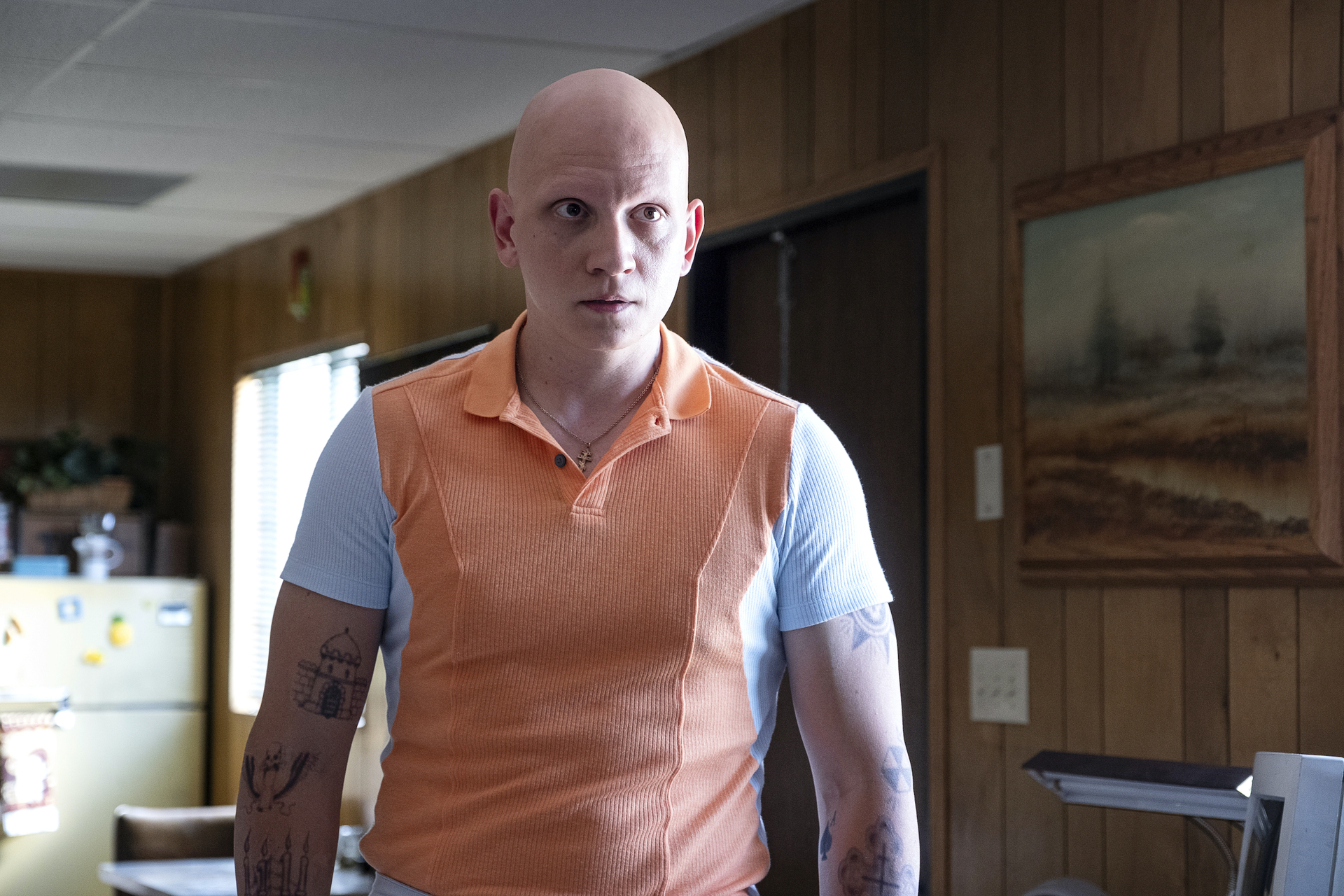
Anthony Carrigan as NoHo Hank.
HADER: Really? Did someone say that to you, “If this comes out, you’ll never work again?”
CARRIGAN: Yeah. To a certain extent, I get it. They signed on for a brooding, smoldering, good looking guy. Then all of a sudden, they got something completely different and they didn’t know what to do with him. The industry is pretty fickle and superficial, but it definitely stung. I had someone tell me that I was no longer attractive. I was like, “Even though I don’t have any hair, I still feel attractive.” She was like, “No. I’m so sorry, you’re not,”—like she was doing me a favor by telling me I’m not attractive anymore.
HADER: Oh my god. This was an agent?
CARRIGAN: Yeah. I spent so long dreading hearing that. I thought it would totally destroy me, and I didn’t. It sucked for a while, but it lit a fire under me. I told myself, “I’m still here, and I’m going to do it anyway.”
HADER: What was that process like then? Were you like, “I’m not going to do the eyebrows anymore. I’m not going to do the hair anymore”?
CARRIGAN: Yeah, and I parted ways with my agents. It sucked, but I don’t fault them. They were limited by their own perspective. It took a while to believe that I could play anything aside from an alien or a cancer survivor. Fortunately, I had really good friends who were bringing me photos of all these models who were shaving their eyebrows, like, “This is could actually look pretty rad, especially on camera.” One thing that I’ve learned since having alopecia is, if you feel like there’s something wrong with you, that’s what you’re broadcasting. People pick up on that. Once I started walking into the room without hiding, it made me a better actor.
HADER: What was that experience of actually leaving your house and going to a meeting? Were you self-conscious or were you like, “Fuck it”?
CARRIGAN: It was a lot of baby steps. For the first few months, I felt weird about leaving my house without makeup and a hat or wig. I’ve talked to a lot of people with alopecia who feel like that’s what they need in order to get by in the world. But at a certain point, I was so sick of it. I was like, “You know what? If this is going to be the thing that determines my career, I might as well embrace it.” Sometimes being hurt in that way can generate a lot of power and anger, and sometimes the frustration outweighs the fear. Then you get to a place where you’re like, “I’m going to do this.” I essentially came up with a pitch for who I was going to be as an actor, that I was no longer the person that was in my old headshot. I was going to be this new type of character actor who wasn’t going to be right for everything, but perfect for certain things. Then, I praying that I would find the people who wouldn’t even notice my hair. Enter Bill Hader.
HADER: [Laughs] But before I showed up, what was that first audition like? When you audition, you’re already self-conscious. It’s like a weird first date. The whole thing sucks.
CARRIGAN: Fortunately I was going in for a character that was just pure rage and could turn into an obnoxious gas. [Both laugh] I was able to get weird and pissed off in an audition, which was something I could access.
HADER: Your audition had supreme confidence. When we shot with you, it was my very first day as a director. I was incredibly anxious. You came out and had the crew laughing really hard. After that day, I looked at Alec Berg [Hader’s Barry co-creator], and we were thinking the same thing: “This guy dies at the end of the pilot. That might not be the smartest thing.” When HBO saw the pilot, they were like, “He’s not dead, is he? That guy’s hilarious.” Jimmy Kimmel texted me, “Where did you find that guy?” Everyone loved you. One other thing we bonded over is anxiety. I definitely had it on SNL. Do you ever feel that way on the show?
CARRIGAN: When you’re super anxious, you shrink down and tighten up. Hank is this open, big character who makes broad gestures. When you open up physically, it weirdly tricks you into feeling more confident.
HADER: That’s true. My anxiety manifests in a way where I get really dizzy, sometimes for like a month. I’ve done TV interviews where I’m barely there. Recently, I had a therapist say, “Tell yourself, ‘I’m experiencing anxiety right now.’” It helps you accept the vulnerability that you’re feeling. The resistance is like quicksand. You sink deeper.
CARRIGAN: Exactly.
HADER: I’m curious, how long are we supposed to talk?
CARRIGAN: I think we’re done. Lightning in a bottle.

